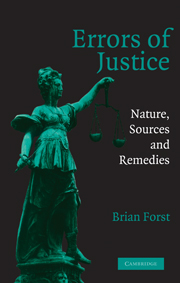Book contents
- Frontmatter
- Contents
- Preface
- Acknowledgments
- 1 The Problem
- 2 Errors of Due Process
- 3 Errors of Impunity
- 4 Frameworks for Analyzing the Incidence of Justice Errors
- 5 Assessing the Cost of Justice Errors
- 6 Standards of Evidence
- 7 Police-Induced Errors
- 8 Prosecution Policy and Justice Errors
- 9 The Jury
- 10 Sentencing and Corrections
- 11 Homicide
- 12 A Matter of Legitimacy
- Bibliography
- Index
- Titles in the series
Preface
Published online by Cambridge University Press: 05 July 2011
- Frontmatter
- Contents
- Preface
- Acknowledgments
- 1 The Problem
- 2 Errors of Due Process
- 3 Errors of Impunity
- 4 Frameworks for Analyzing the Incidence of Justice Errors
- 5 Assessing the Cost of Justice Errors
- 6 Standards of Evidence
- 7 Police-Induced Errors
- 8 Prosecution Policy and Justice Errors
- 9 The Jury
- 10 Sentencing and Corrections
- 11 Homicide
- 12 A Matter of Legitimacy
- Bibliography
- Index
- Titles in the series
Summary
Requiring students of criminal justice to learn the fundamentals of statistical inference may or may not be good for them, but it surely can enlighten the instructor. In searching for a way to motivate my students to learn about Type I and II errors and the logic of statistical inference, I have asked them whether they are concerned about errors of inference made by police, prosecutors, juries, and sentencing judges. It has struck me, in discussing these metaphors, that we have a coherent, sophisticated, effective framework for managing errors in statistical inference, but no such framework for managing errors in the criminal justice system. The errors are not identical, to be sure, but they are parallel. In both domains, some procedures tend to shift errors, others either reduce or increase both sets of errors. We can examine the shifts in errors of inference in hypothesis testing that derive from changes in the alpha level, but haven't a clue as to the effect of a change in the standard of evidence on corresponding errors of justice. We haven't attempted even to ask. We know precisely how increases in sample size reduce both Type I and II errors for given parameter values, but we have no idea the extent to which DNA evidence simultaneously reduces the rate of erroneous convictions in homicide or rape cases and increases the rate at which such crimes are solved.
- Type
- Chapter
- Information
- Errors of JusticeNature, Sources and Remedies, pp. xiii - xivPublisher: Cambridge University PressPrint publication year: 2003



